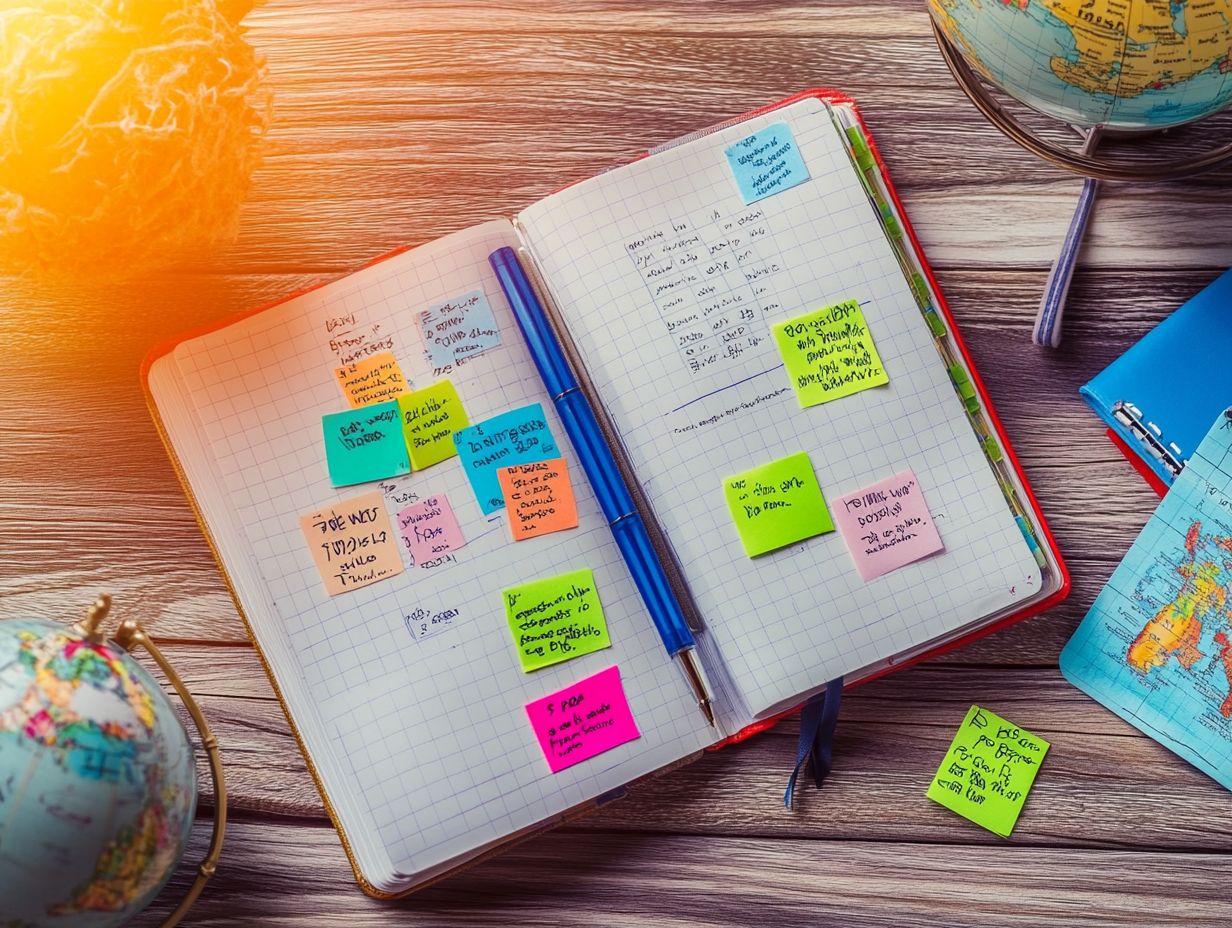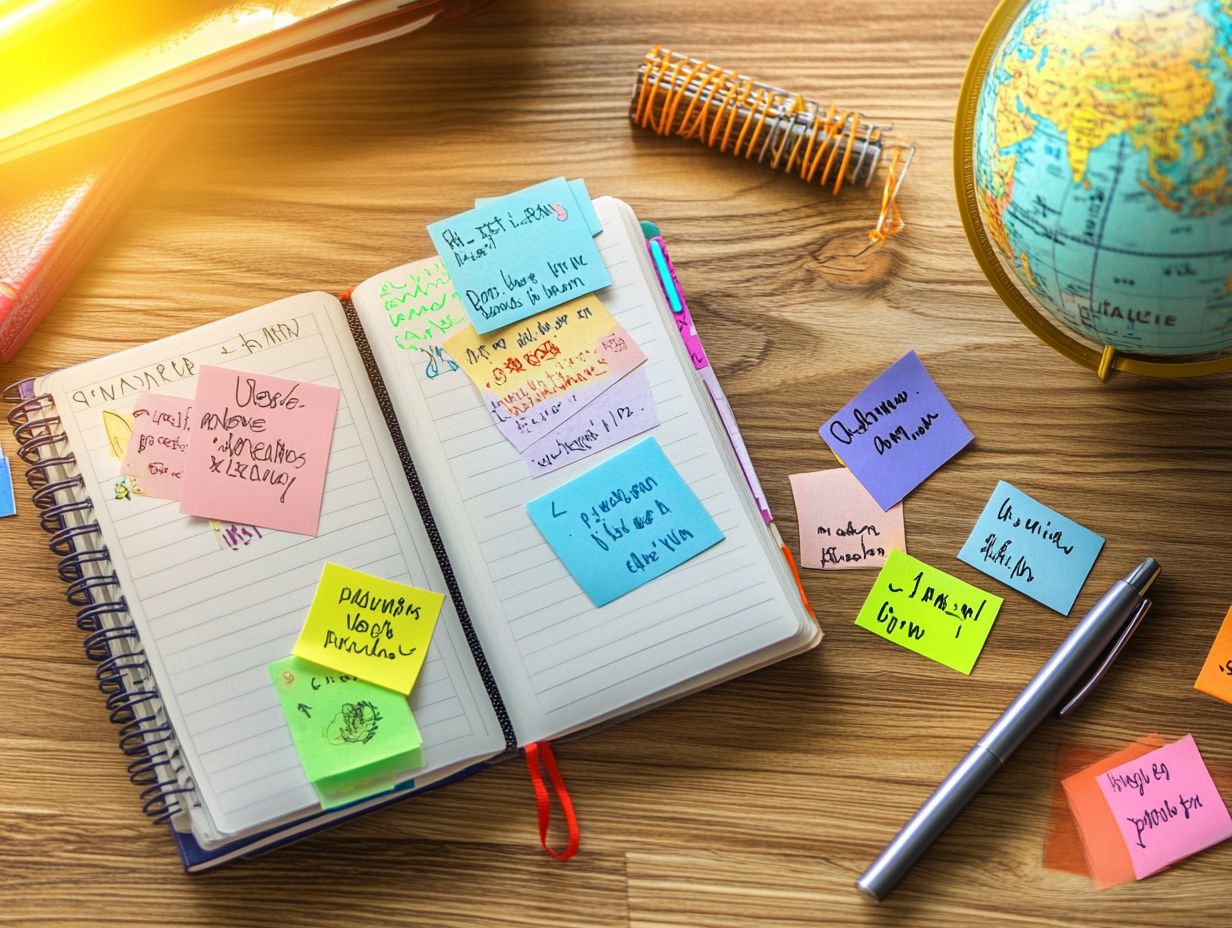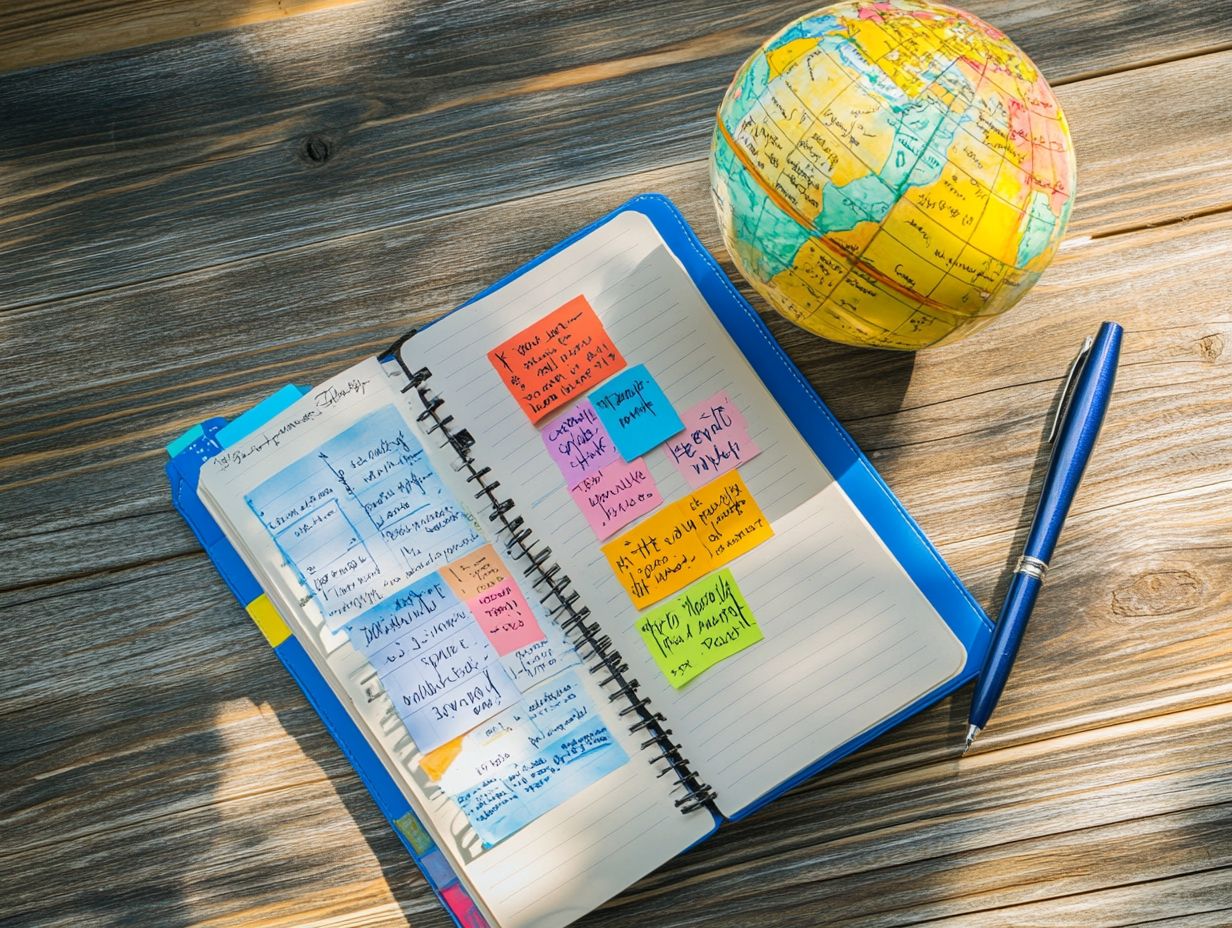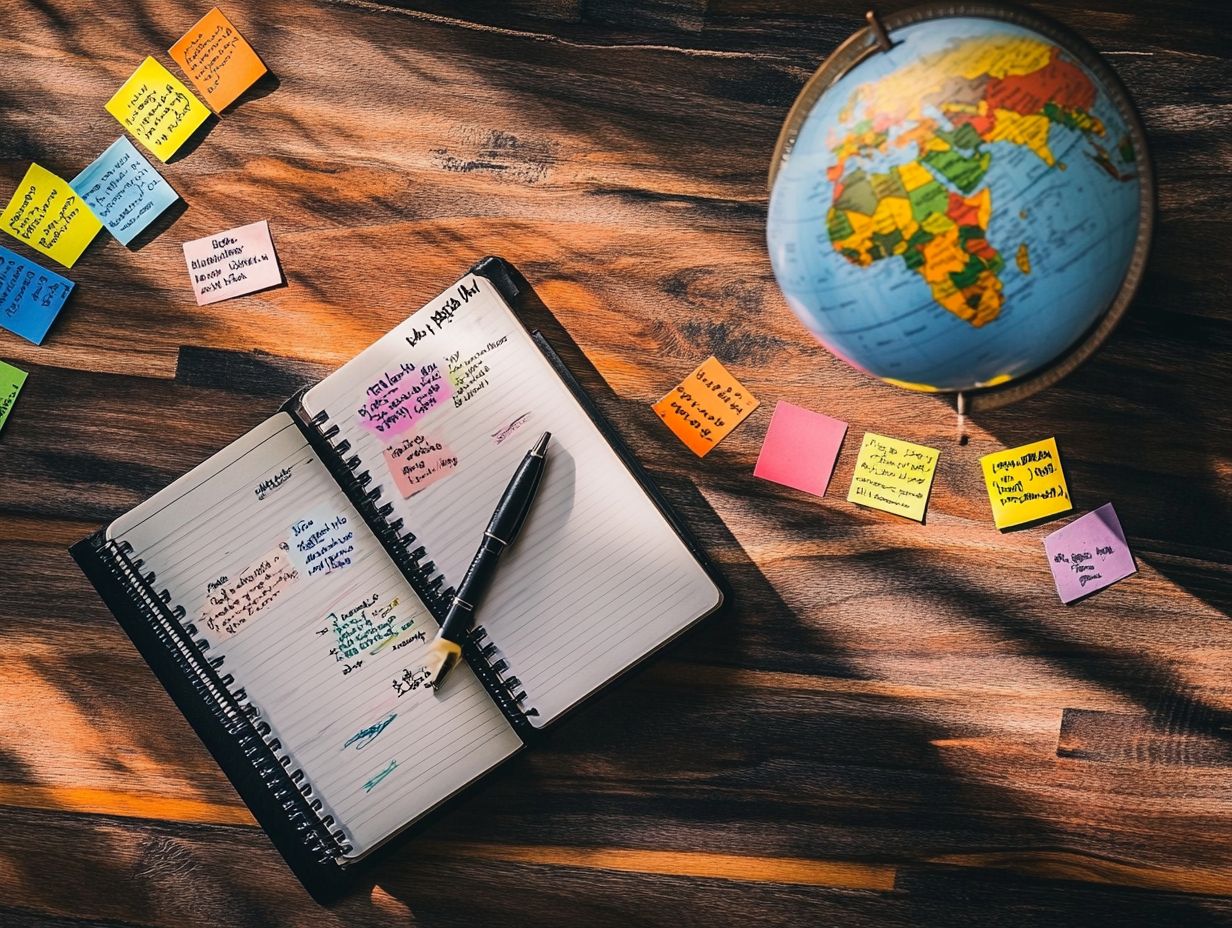5 Essential Vocabulary Tips for Language Learners
Building a robust vocabulary is crucial in your journey to mastering a new language. Whether you re just starting or looking to refine your skills, expanding your word bank can make all the difference.
This article explores five essential tips to elevate your vocabulary. From immersing yourself in extensive reading to using effective memory techniques and engaging with the language through various media, these strategies will empower you to communicate more confidently and fluently.
We will also address common pitfalls and provide insights on practicing and applying your newly acquired words in real-life conversations. Prepare to transform your language learning experience into something truly rewarding!
Contents
- Key Takeaways:
- 1. Read, Read, Read
- 2. Practice, Practice, Practice
- 3. Learn Root Words and Affixes
- 4. Use Flashcards or Memory Games
- 5. Watch Movies or TV Shows in the Target Language
- How Does Vocabulary Affect Language Learning?
- What Are the Common Mistakes Language Learners Make with Vocabulary?
- How Can One Expand Their Vocabulary Beyond Basic Words?
- What Are the Best Ways to Memorize New Vocabulary?
- How Can One Practice Using New Vocabulary in Conversations?
- What Are the Benefits of Having a Strong Vocabulary in a Second Language?
- Frequently Asked Questions
- What are the 5 essential vocabulary tips for language learners?
- How can I incorporate regular practice into my vocabulary learning?
- What is the importance of learning vocabulary in context?
- Are flashcards an effective way to learn vocabulary?
- How can I improve my ability to think in the target language?
- How can reading and listening help me expand my vocabulary?
Key Takeaways:

Keep reading in the target language to increase exposure and understanding of vocabulary.
Consistent practice is key to retaining and expanding vocabulary.
Study root words and affixes to better understand and remember new vocabulary.
1. Read, Read, Read
Reading extensively is one of the most powerful methods for enhancing your vocabulary. If you’re learning languages like English, Spanish, French, or Mandarin Chinese, establishing a consistent reading habit is crucial.
By immersing yourself in rich texts, you encounter new words in context, significantly aiding vocabulary acquisition and boosting your reading comprehension.
Engaging with a variety of genres novels, short stories, articles, or poetry exposes you to diverse language styles, enriching your linguistic repertoire.
When choosing reading materials, consider your current language level and personal interests. Beginners might find simplified stories beneficial, while advanced learners can tackle more complex texts.
Incorporating bilingual dictionaries into your reading process offers deeper insights into nuanced language use, enhancing vocabulary retention and improving fluency.
This diverse reading practice strengthens your language skills and ignites a passion for lifelong learning!
2. Practice, Practice, Practice
Consistent practice is essential for mastering your vocabulary skills. To enhance your language learning journey, be aware of the 5 things to avoid when learning a new language. It’s a fundamental part of any language learning journey.
Engaging in targeted exercises and enrolling in structured writing courses can significantly enhance your ability to retain and use new words confidently.
Using various practice methods, such as writing prompts, creates opportunities to use vocabulary in context, fostering a deeper understanding of word meanings.
Vocabulary tests assess your progress and highlight areas needing extra attention.
Language exchange sessions offer a fantastic real-world context to practice speaking with native speakers, solidifying your grasp of commonly used terms.
Utilizing mnemonic devices helps you create memorable associations with new words, while spaced repetition ensures you review vocabulary over time, keeping forgetfulness at bay.
By integrating these strategies into your daily routine like labeling household items or indulging in extensive reading you reinforce your skills naturally and effectively.
3. Learn Root Words and Affixes
Understanding root words and affixes can elevate your vocabulary skills, enabling you to decipher meanings and systematically build your lexicon.
This approach helps you acquire new words and deepens your appreciation for the history of words, enriching your experience as you navigate languages like English and Spanish.
By breaking down complex words into smaller components, you ll easily recognize synonyms and antonyms that share the same roots, expanding your vocabulary choices.
For instance, the root dict means to say, leading to terms like predict (to say beforehand) or contradict (to say against).
Activities like word mapping and creating flashcards featuring various roots invite you to explore new vocabulary creatively.
Incorporating games like word bingo transforms learning into an enjoyable experience, reinforcing your comprehension while allowing you to relish the journey of language acquisition.
Start implementing these exciting tips today to enhance your vocabulary skills and elevate your language journey!
4. Use Flashcards or Memory Games

Using flashcards or memory games provides an engaging way to reinforce vocabulary acquisition. This method solidifies your understanding of words and their meanings through active recall.
Digital flashcards come with the added benefits of spaced repetition, a learning technique that helps you remember information more effectively by reviewing it at spaced intervals. This makes them a powerful tool for mastering new vocabulary in a second language.
Customizing these digital flashcards to reflect your interests and various language themes creates a more immersive learning experience. For instance, incorporating cultural elements related to the language can enhance your engagement and contextual understanding.
To boost your memory retention, consider using mnemonic devices. These simple yet effective memory aids transform complex terms into relatable associations, making them easier to recall.
Incorporating enjoyable games, such as matching exercises or timed quizzes, fosters a playful learning environment and helps solidify your vocabulary skills. This exciting approach makes your learning process not only effective but also fun!
5. Watch Movies or TV Shows in the Target Language
Watching movies or TV shows in your target language is not just entertaining; it’s a fun way to enhance your vocabulary and elevate your language skills.
By immersing yourself in visual media whether it s English, Spanish, French, or Mandarin Chinese you can contextualize new words while boosting your reading comprehension and listening abilities.
Each genre brings its own fun vocabulary and cultural insights, catering to a wide range of interests and proficiency levels.
For example, comedic shows often introduce slang and everyday expressions, while dramatic narratives might challenge you with more complex dialogue and formal vocabulary.
Using subtitles can significantly reinforce your vocabulary acquisition, allowing you to see and hear words together. Discussing key scenes with others deepens your understanding, offering valuable context for new terms.
Make it a habit to jot down unfamiliar words and phrases while watching; this enhances retention and cultivates a proactive approach to your language learning journey.
How Does Vocabulary Affect Language Learning?
Vocabulary is crucial in your language learning journey. It directly influences your ability to communicate effectively and comprehend content in a second language. To enhance your skills, consider exploring 5 fun challenges for language learners.
A strong vocabulary boosts your reading comprehension and helps conversations and written communication flow more smoothly, paving the way for greater success in mastering your target language.
When you expand your vocabulary, you gain the ability to express your thoughts and emotions precisely, allowing you to convey your ideas clearly. This clarity is especially important in discussions and essay writing, as it helps you avoid confusion.
A well-rounded vocabulary enhances your comprehension skills, enabling you to grasp the nuances of both text and spoken language. Engaging with varied reading materials, using flashcards, and incorporating new words into daily conversations can dramatically improve your word retention.
This diverse vocabulary isn t just a collection of words; it s the key to unlocking deeper connections and understanding in your communicative interactions. Dive into these strategies today and watch your language skills soar!
What Are the Common Mistakes Language Learners Make with Vocabulary?
Language learners often encounter common vocabulary pitfalls that can stifle proficiency and hinder vocabulary acquisition. Relying too heavily on rote memorization or neglecting to practice new words in context can create gaps in understanding. To overcome these challenges, consider mastering Spanish with helpful tips that enhance your learning experience.
One significant oversight is overlooking synonyms and antonyms, which can restrict your expressive capabilities. Weaving varied vocabulary into your daily conversations enhances comprehension and makes your speech more engaging.
To conquer these challenges, actively engaging with new words in diverse contexts is essential. Keeping a vocabulary journal where you jot down synonyms, antonyms, and example sentences can be immensely beneficial.
Joining conversational groups or participating in language exchanges facilitates practical application and reinforces the importance of contextual learning, ultimately boosting your confidence and fluency.
How Can One Expand Their Vocabulary Beyond Basic Words?

Expanding your vocabulary is vital for fluency in a language. You can use fun ways to engage with language learning as effective strategies to achieve this goal.
Read different materials to learn new words. Adopt a word-of-the-day habit and interact with language resources to enhance your vocabulary.
You can also use bilingual dictionaries for context and examples. These can clarify the meanings of new terms and make them easier to remember.
Online platforms, like language learning apps and forums, offer practice through exercises and interactions with others. Engage regularly for the best results.
Connecting new words with familiar ones boosts retention. Explore synonyms and antonyms to gain a nuanced understanding of language.
What Are the Best Ways to Memorize New Vocabulary?
To memorize new vocabulary, use techniques that fit your learning style. Memory tricks can create memorable links with new words.
Spaced repetition is a game-changer. It helps you revisit words at set intervals for better recall.
Visualization techniques can also enhance learning. Create vivid mental images tied to vocabulary for an engaging experience.
Personalized flashcards summarizing definitions make review quick and effective. Tailor these strategies to your preferences for better results.
Regular review builds confidence in using new vocabulary. Practice in real-life situations to solidify your skills.
How Can One Practice Using New Vocabulary in Conversations?
Practicing new vocabulary in conversations strengthens your skills. Engage in dialogue with native speakers or fellow learners to boost retention.
Incorporating new words into everyday chats helps solidify your understanding. This applies your vocabulary in real contexts.
Explore various platforms for practice. Language exchange meetups connect you with peers in informal settings.
Online forums facilitate discussions on topics of interest, while digital platforms offer structured practice. Pairing with mentors or other learners can guide your experience.
Feeling confident while using new vocabulary enhances communication. Create a supportive learning environment to encourage experimentation.
This freedom allows you to engage more effectively in your language journey.
What Are the Benefits of Having a Strong Vocabulary in a Second Language?
Having a strong vocabulary in a second language opens up a world of benefits for you. It enhances your communication abilities and boosts your understanding of complex texts, elevating your fluency in speaking and writing.
With a rich vocabulary at your disposal, you can express yourself more precisely and confidently, leading to more rewarding language experiences. A rich vocabulary is key to expressing ideas clearly and plays a crucial role in your academic success, allowing you to understand complex ideas and articulate your thoughts effectively in written assignments and discussions.
In a professional context, it can be a game changer for your career advancement. It equips you to impress potential employers during interviews. It also helps you build personal connections through effective communication, enabling you to share experiences and emotions with greater richness.
These benefits make learning a language exciting and rewarding, serving as a compelling motivator to continually seek out and embrace new words. So keep pushing to learn new words!
Frequently Asked Questions

What are the 5 essential vocabulary tips for language learners?
The 5 essential vocabulary tips for language learners are: 1) Practice regularly, 2) Learn vocabulary in context, 3) Use flashcards, 4) Try to think in the target language, and 5) expand your vocabulary through reading and listening.
How can I incorporate regular practice into my vocabulary learning?
Regular practice can be incorporated by setting aside a specific time each day to study vocabulary, using vocabulary in daily conversations, and regularly reviewing previously learned words.
What is the importance of learning vocabulary in context?
Learning vocabulary in context helps learners understand how a word is used in a sentence, making it easier to remember and use the word in the future. It also helps learners understand the nuances of a word and its appropriate usage.
Are flashcards an effective way to learn vocabulary?
Yes, flashcards are a tried and tested method for learning vocabulary. They help with repetition and retention, making it easier for learners to remember new words.
How can I improve my ability to think in the target language?
To improve your ability to think in the target language, try to immerse yourself in it as much as possible. This can be done by watching movies or TV shows in the target language, listening to music, or even speaking to native speakers.
How can reading and listening help me expand my vocabulary?
Reading and listening to content in the target language exposes learners to new words and their usage in context. This helps expand their vocabulary and improves their understanding of the language as a whole.






